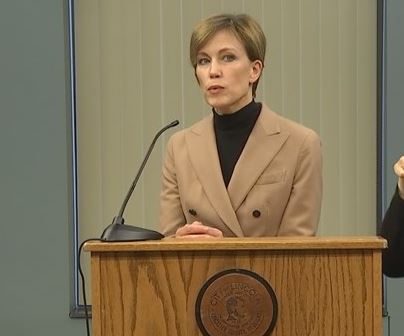Virus Infections Cause Racial, Ethnic Disparities & Slash Sales Tax Collections

The Lincoln-Lancaster County Health Department began Wednesday to release data on the number of cases of Covid-19 confirmed among members of various ethnic groups. The figures show a significantly higher percentage of cases among people of Asian and Hispanic origin than their percentage of the general population.
33.4% of the cases of the cases have been confirmed in people of Asian descent, 30.7 % of them among the White population, and 23.9% in the Hispanic population.
Mayor Leirion Gaylor Baird called the numbers “deeply disturbing” and said we need to investigate them and understand them.
The Mayor also said the pandemic is also causing a significant disruption in tax revenue. Sales and Use taxes have been impacted by the closure of restaurants, bars and other businesses. The City is in the midst of its budget process now, and the Mayor said signficant cutbacks are likely.
Gaylor Baird said the City expects a budget gap of $17 million in the 2020-2021 fiscal year and a gap of $22 million in 2021-2022. The Mayor is scheduled to present her recommended budget to the City Council in June.
“We know that every institution, organization, business, and employer in our city has been affected in some way by the economic disruption caused by COVID-19, and the City of Lincoln is no exception,” she said. “As we prepare to present our recommended city budget for the next fiscal period, we are making some hard decisions to address a significant shortfall in sales tax for the current budget year.”
Sales taxes make up about 47 percent of the City’s General Fund revenue. The General Fund finances the day-to-day operation of basic governmental activities and services, such as public safety, legal services, libraries, aging programs, planning and development, and parks and trails.
March sales tax revenues will not be received until mid-May, and April sales tax revenues will not be received until mid-June. The City is estimating a 16 percent drop in sales tax revenue in May and August, and a 40 percent drop in June and July. That would result in a $5.3 million sales tax shortfall in the current fiscal year compared to original projections.
The City also saw in March an average 32 percent drop in revenues from occupation taxes on industries including restaurants, hotels, and auto rentals. In addition to that decline, the Mayor said the City anticipates major reductions to interest earnings, parking revenues, gas taxes, recreation receipts and a number of other core revenues for this fiscal year.
To respond to the budget challenges, the Mayor said she has implemented a hiring freeze except for essential services positions. City employee out-of-town, professionally-related travel has been suspended, and capital spending reductions are being considered. Internal transfers and rate holidays are being enacted to replenish the General Fund and strengthen the City’s cash position.
“Looking to the horizon, changes to our operations and potential service cuts due to the fiscal impact of the pandemic are real possibilities,” she said. “At the same time, I also view these decisions through the lens of a major local employer. The City of Lincoln has over 2,000 employees who provide for their families and contribute to our economy. I do not take this responsibility lightly.”






